- Home
- Margaret Atwood
The Blind Assassin Page 8
The Blind Assassin Read online
Page 8
After they had skated around the pond several times, my father asked my mother to marry him. I expect he did it awkwardly, but awkwardness in men was a sign of sincerity then. At this instant, although they must have been touching at shoulder and hip, neither one was looking at the other; they were side by side, right hands joined across the front, left hands joined at the back. (What was she wearing? Reenie knew this too. A blue knitted scarf, a tam and knitted gloves to match. She'd knitted them herself. A winter coat of walking length, hunting green. A handkerchief tucked into her sleeve - an item she never forgot, according to Reenie, unlike some she could name.)
What did my mother do at this crucial moment? She studied the ice. She did not reply at once. This meant yes.
All around them were the snow-covered rocks and the white icicles - everything white. Under their feet was the ice, which was white also, and under that the river water, with its eddies and undertows, dark but unseen. This was how I pictured that time, the time before Laura and I were born - so blank, so innocent, so solid to all appearances, but thin ice all the same. Beneath the surfaces of things was the unsaid, boiling slowly.
Then came the ring, and the announcement in the papers; and then - once Mother had returned from completing the teaching year, which it was her duty to do - there were formal teas. Beautifully set out they were, with rolled asparagus sandwiches and sandwiches with watercress in them, and three kinds of cake - a light, a dark, and a fruit - and the tea itself in silver services, with roses on the table, white or pink or perhaps a pale yellow, but not red. Red was not for engagement teas. Why not? You'll find out later, said Reenie.
Then there was the trousseau. Reenie enjoyed reciting the details of this - the nightgowns, the peignoirs, the kinds of lace on them, the pillowcases embroidered with monograms, the sheets and petticoats. She spoke of cupboards and of bureau drawers and linen closets, and of what sorts of things should be kept in them, neatly folded. There was no mention of the bodies over which all these textiles would eventually be draped: weddings, for Reenie, were mostly a question of cloth, at least on the face of it.
Then there was the list of guests to be compiled, the invitations to be written, the flowers to be selected, and so on up to the wedding.
And then, after the wedding, there was the war. Love, then marriage, then catastrophe. In Reenie's version, it seemed inevitable.
The war began in the August of 1914, shortly after my parents' marriage. All three brothers enlisted at once, no question about it. Amazing to consider now, this lack of question. There's a photo of them, a fine trio in their uniforms, with grave, naive foreheads and tender moustaches, their smiles nonchalant, their eyes resolute, posing as the soldiers they had not yet become. Father is the tallest. He always kept this photo on his desk.
They joined the Royal Canadian Regiment, the one you always joined if you were from Port Ticonderoga. Almost immediately they were posted to Bermuda to relieve the British regiment stationed there, and so, for the war's first year, they spent their time going on parade and playing cricket. Also chafing at the bit, or so their letters claimed.
Grandfather Benjamin read these letters avidly. As time wore on without a victory for either side, he became more and more jittery and uncertain. This was not the way things ought to have gone. The irony was that his business was booming. He'd recently expanded into celluloid and rubber, for the buttons that is, which allowed for higher volumes; and due to the political contacts Adelia had helped him to make, his factories received a great many orders to supply the troops. He was as honest as he'd always been, he didn't deliver shoddy goods, he was not a war profiteer in that sense. But it cannot be said that he did not profit.
War is good for the button trade. So many buttons are lost in a war, and have to be replaced - whole boxfuls, whole truckloads of buttons at a time. They're blown to pieces, they sink into the ground, they go up in flames. The same can be said for undergarments. From a financial point of view, the war was a miraculous fire: a huge, alchemical conflagration, the rising smoke of which transformed itself into money. Or it did for my grandfather. But this fact no longer delighted his soul or propped up his sense of his own rectitude, as it might have done in earlier, more self-satisfied years. He wanted his sons back. Not that they'd gone anywhere dangerous yet: they were still in Bermuda, marching around in the sun.
Following their honeymoon (to the Finger Lakes, in New York State), my parents had been staying at Avilion until they could set up their own establishment, and Mother remained there to supervise my grandfather's household. They were short-staffed, because all able hands were needed either for the factories or for the army, but also because it was felt that Avilion should set an example by reducing expenditures. Mother insisted on plain meals - pot roast on Wednesdays, baked beans on a Sunday evening - which suited my grandfather fine. He'd never really been comfortable with Adelia's fancy menus.
In August of 1915, the Royal Canadian Regiment was ordered back to Halifax, to equip for France. It stayed in port for over a week, taking on supplies and new recruits and exchanging tropical uniforms for warmer clothing. The men were issued with Ross rifles, which would later jam in the mud, leaving them helpless.
My mother took the train to Halifax to see my father off. It was crammed with men en route to the Front; she could not get a sleeper, so she travelled sitting up. There were feet in the aisles, and bundles, and spittoons; coughing, snoring - drunken snoring, no doubt. As she looked at the boyish faces around her, the war became real to her, not as an idea but as a physical presence. Her young husband might be killed. His body might perish; it might be torn apart; it might become part of the sacrifice that - it was now clear - would have to be made. Along with this realization came desperation and a shrinking terror, but also - I'm sure - a measure of bleak pride.
I don't know where the two of them stayed in Halifax, or for how long. Was it a respectable hotel or, because rooms were scarce, a cheap dive, a harbourside flophouse? Was it for a few days, a night, a few hours? What passed between them, what was said? The usual sorts of things, I suppose, but what were they? It is no longer possible to know. Then the ship with the regiment in it set sail - it was the SS Caledonian - and my mother stood on the dock with the other wives, waving and weeping. Or perhaps not weeping: she would have found it self-indulgent.
Somewhere in France. I cannot describe what is happening here, wrote my father, and so I will not attempt it. We can only trust that this war is for the best, and that civilization will be preserved and advanced by it. The casualties are (word scratched out) numerous. I never knew before what men are capable of. What must be endured is beyond (word scratched out). I think of all at home every day, and especially you, my dearest Liliana.
At Avilion, my mother set her will in motion. She believed in public service; she felt she had to roll up her sleeves and do something useful for the war effort. She organized a Comfort Circle, which collected money through rummage sales. This was spent on small boxes containing tobacco and candies, which were sent off to the trenches. She threw open Avilion for these functions, which (said Reenie) was hard on the floors. In addition to the rummage sales, every Tuesday afternoon her group knitted for the troops, in the drawing room - washcloths for the beginners, scarves for the intermediates, balaclavas and gloves for the experts. Soon another battalion of recruits was added, on Thursdays - older, less literate women from south of the Jogues who could knit in their sleep. These made baby garments for the Armenians, said to be starving, and for something called Overseas Refugees. After two hours of knitting, a frugal tea was served in the dining room, with Tristan and Iseult looking wanly down.
When maimed soldiers began to appear, on the streets and in the hospitals of nearby towns - Port Ticonderoga did not yet have a hospital - my mother visited them. She opted for the worst cases - men who were not (said Reenie) likely to win any beauty contests - and from these visits she would return drained and shaken, and might even weep, in the kitchen, drinking th
e cocoa Reenie would make to prop her up. She did not spare herself, said Reenie. She ruined her health. She went beyond her strength, especially considering her condition.
What virtue was once attached to this notion - of going beyond your strength, of not sparing yourself, of ruining your health! Nobody is born with that kind of selflessness: it can be acquired only by the most relentless discipline, a crushing-out of natural inclination, and by my time the knack or secret of it must have been lost. Or perhaps I didn't try, having suffered from the effects it had on my mother.
As for Laura, she was not selfless, not at all. Instead she was skinless, which is a different thing.
I was born in early June of 1916. Shortly afterwards, Percy was killed in heavy shelling at the Ypres Salient, and in July Eddie died at the Somme. Or it was assumed he had died: where he'd been last seen there was a large crater. These were hard events for my mother, but much harder for my grandfather. In August he had a devastating stroke, which affected his speech and his memory.
Unofficially, my mother took over the running of the factories. She interposed herself between my grandfather - said to be convalescing - and everyone else, and met daily with the male secretary and with the various factory foremen. As she was the only one who could understand what my grandfather was saying, or who claimed she could, she became his interpreter; and as the only one allowed to hold his hand, she guided his signature; and who's to say she didn't use her own judgment sometimes?
Not that there were no problems. When the war began, a sixth of the workers had been women. By the end of it this number was two-thirds. The remaining men were old, or partially crippled, or in some other way unfit for war. These resented the ascendancy of the women, and grumbled about them or made vulgar jokes, and in their turn the women considered them weaklings or slackers and held them in ill-disguised contempt. The natural order of things - what my mother felt to be the natural order - was turning turtle. Still, the pay was good, and money greases the wheels, and on the whole my mother was able to keep things running smoothly enough.
I imagine my grandfather, sitting in his library at night, in his green leather-covered chair studded with brass nails, at his desk, which was mahogany. His fingers are tented together, those of his feeling hand and those of his hand without feeling. He's listening for someone. The door is half-open; he sees a shadow outside it. He says, "Come in" - he intends to say it - but nobody enters, or answers.
The brusque nurse arrives. She asks him what he can be thinking of, sitting alone in the dark like that. He hears a sound, but it isn't words, it's more like ravens; he doesn't answer. She takes him by the arm, lifts him easily out of his chair, shuffles him off to bed. Her white skirts rustle. He hears a dry wind, blowing through weedy autumn fields. He hears the whisper of snow.
Did he know his two sons were dead? Was he wishing them alive again, safe home? Would it have been a sadder ending for him, to have had his wish come true? It might have been - it often is - but such thoughts are not consoling.
The gramophone
Last night I watched the weather channel, as is my habit. Elsewhere in the world there are floods: roiling brown water, bloated cows floating by, survivors huddled on rooftops. Thousands have drowned. Global warming is held accountable: people must stop burning things up, it is said. Gasoline, oil, whole forests. But they won't stop. Greed and hunger lash them on, as usual.
Where was I? I turn back the page: the war is still raging. Raging is what they used to say, for wars; still do, for all I know. But on this page, a fresh, clean page, I will cause the war to end - I alone, with a stroke of my black plastic pen. All I have to do is write: 1918. November 11. Armistice Day.
There. It's over. The guns are silent. The men who are left alive look up at the sky, their faces grimed, their clothing sodden; they climb out of their foxholes and filthy burrows. Both sides feel they have lost. In the towns, in the countryside, here and across the ocean, the church bells all begin to ring. (I can remember that, the bells ringing. It's one of my first memories. It was so strange - the air was so full of sound, and at the same time so empty. Reenie took me outside to hear. There were tears running down her face. Thank God, she said. The day was chilly, there was frost on the fallen leaves, a skim of ice on the lily pond. I broke it with a stick. Where was Mother?)
Father had been wounded at the Somme, but he'd recovered from that and had been made a second lieutenant. He was wounded again at Vimy Ridge, though not severely, and was made a captain. He was wounded again at Bourlon Wood, this time worse. It was while he was recovering in England that the war ended.
He missed the jubilant welcome for the returning troops at Halifax, the victory parades and so forth, but there was a special reception in Port Ticonderoga just for him. The train stopped. Cheering broke out. Hands reached up to help him down, then hesitated. He emerged. He had one good eye and one good leg. His face was gaunt, seamed, fanatical.
Farewells can be shattering, but returns are surely worse. Solid flesh can never live up to the bright shadow cast by its absence. Time and distance blur the edges; then suddenly the beloved has arrived, and it's noon with its merciless light, and every spot and pore and wrinkle and bristle stands clear.
Thus my mother and my father. How could either of them atone to the other for having changed so much? For failing to be what was expected. How could there not be grudges? Grudges held silently and unjustly, because there was nobody to blame, or nobody you could put your finger on. The war was not a person. Why blame a hurricane?
There they stand, on the railway platform. The town band plays, brass mostly. He's in his uniform; his medals are like holes shot in the cloth, through which the dull gleam of his real, metal body can be seen. Beside him, invisible, are his brothers - the two lost boys, the ones he feels he has lost. My mother is there in her best dress, a belted affair with lapels, and a hat with a crisp ribbon. She smiles tremulously. Neither knows quite what to do. The newspaper camera catches them in its flash; they stare, as if surprised in crime. My father is wearing a black patch over his right eye. His left eye glares balefully. Underneath the patch, not yet revealed, is a web of scarred flesh, his missing eye the spider.
"Chase Heir Hero Returns," the paper will trumpet. That's another thing: my father is now the heir, which is to say he's fatherless as well as brotherless. The kingdom is in his hands. It feels like mud.
Did my mother cry? It's possible. They must have kissed awkwardly, as if at a box social, one for which he'd bought the wrong ticket. This wasn't what he'd remembered, this efficient, careworn woman, with a pince-nez like some maiden aunt's glinting on a silver chain around her neck. They were now strangers, and - it must have occurred to them - they always had been. How harsh the light was. How much older they'd become. There was no trace of the young man who'd once knelt so deferentially on the ice to lace up her skates, or of the young woman who'd sweetly accepted this homage.
Something else materialized like a sword between them. Of course he'd had other women, the kind who hung around battlefields, taking advantage. Whores, not to mince a word my mother would never have pronounced. She must have been able to tell, the first time he laid a hand on her: the timidity, the reverence, would have been gone. Probably he'd held out against temptation through Bermuda, then through England, up to the time when Eddie and Percy were killed and he himself was wounded. After that he'd clutched at life, at whatever handfuls of it might come within his reach. How could she fail to understand his need for it, under the circumstances?
She did understand, or at least she understood that she was supposed to understand. She understood, and said nothing about it, and prayed for the power to forgive, and did forgive. But he can't have found living with her forgiveness all that easy. Breakfast in a haze of forgiveness: coffee with forgiveness, porridge with forgiveness, forgiveness on the buttered toast. He would have been helpless against it, for how can you repudiate something that is never spoken? She resented, too, the nurse, or the many nurse
s, who had tended my father in the various hospitals. She wished him to owe his recovery to her alone - to her care, to her tireless devotion. That is the other side of selflessness: its tyranny.
However, my father wasn't so healthy as all that. In fact he was a shattered wreck, as witness the shouts in the dark, the nightmares, the sudden fits of rage, the bowl or glass thrown against the wall or floor, though never at her. He was broken, and needed mending: therefore she could still be useful. She would create around him an atmosphere of calm, she would indulge him, she would coddle him, she would put flowers on his breakfast table and arrange his favourite dinners. At least he hadn't caught some evil disease.
However, a much worse thing had happened: my father was now an atheist. Over the trenches God had burst like a balloon, and there was nothing left of him but grubby little scraps of hypocrisy. Religion was just a stick to beat the soldiers with, and anyone who declared otherwise was full of pious drivel. What had been served by the gallantry of Percy and Eddie - by their bravery, their hideous deaths? What had been accomplished? They'd been killed by the blunderings of a pack of incompetent and criminal old men who might just as well have cut their throats and heaved them over the side of the SS Caledonian. All the talk of fighting for God and Civilization made him vomit.
My mother was appalled. Was he saying that Percy and Eddie had died for no higher purpose? That all those poor men had died for nothing? As for God, who else had seen them through this time of trial and suffering? She begged him at the very least to keep his atheism to himself. Then she was deeply ashamed for having asked this - as if what mattered most to her was the opinion of the neighbours, and not the relationship in which my father's living soul stood to God.

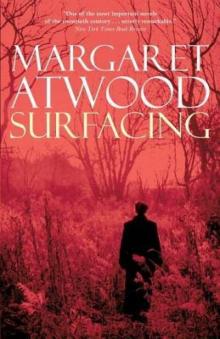 Surfacing
Surfacing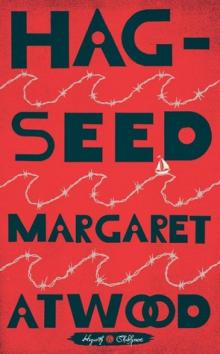 Hag-Seed
Hag-Seed Oryx and Crake
Oryx and Crake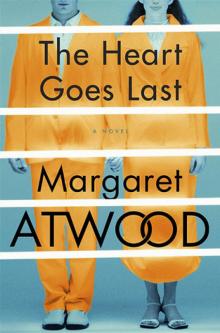 The Heart Goes Last
The Heart Goes Last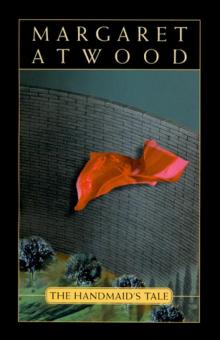 The Handmaid's Tale
The Handmaid's Tale Lady Oracle
Lady Oracle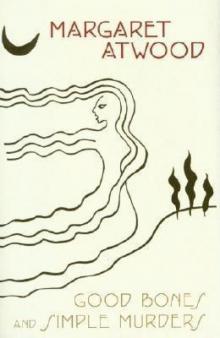 Good Bones and Simple Murders
Good Bones and Simple Murders The Robber Bride
The Robber Bride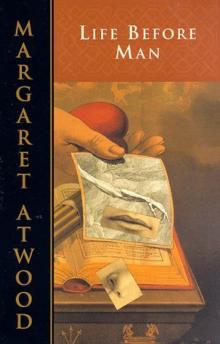 Life Before Man
Life Before Man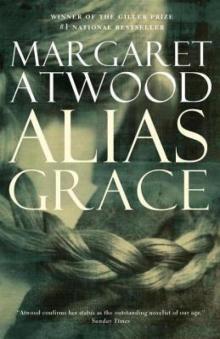 Alias Grace
Alias Grace The Blind Assassin
The Blind Assassin Cat's Eye
Cat's Eye The Testaments
The Testaments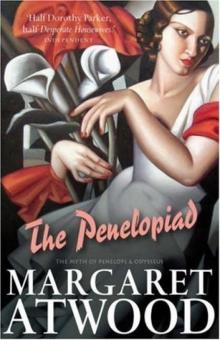 The Penelopiad
The Penelopiad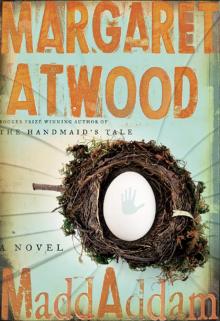 MaddAddam
MaddAddam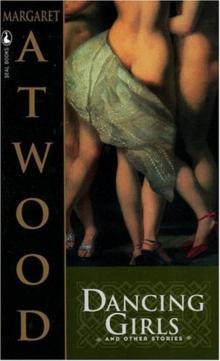 Dancing Girls & Other Stories
Dancing Girls & Other Stories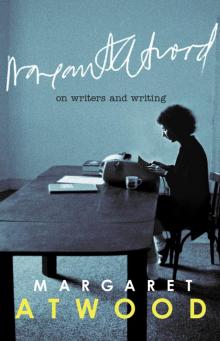 On Writers and Writing
On Writers and Writing Selected Poems II (1976-1986)
Selected Poems II (1976-1986) Wilderness Tips
Wilderness Tips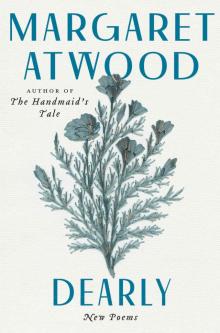 Dearly
Dearly The Tent
The Tent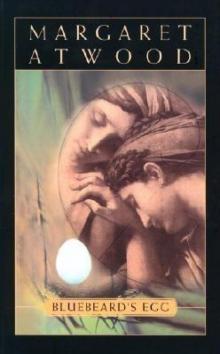 Bluebeard's Egg
Bluebeard's Egg The Edible Woman
The Edible Woman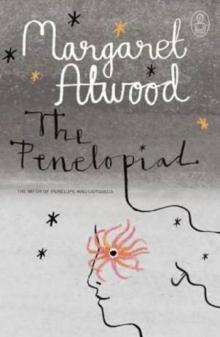 The Penelopiad: The Myth of Penelope and Odysseus
The Penelopiad: The Myth of Penelope and Odysseus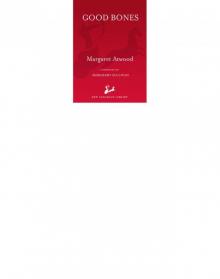 Good Bones
Good Bones I Dream of Zenia with the Bright Red Teeth
I Dream of Zenia with the Bright Red Teeth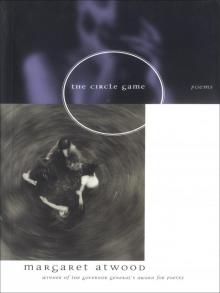 Circle Game
Circle Game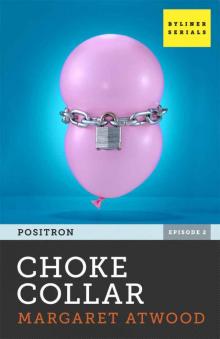 Choke Collar: Positron, Episode Two
Choke Collar: Positron, Episode Two Stone Mattress: Nine Tales
Stone Mattress: Nine Tales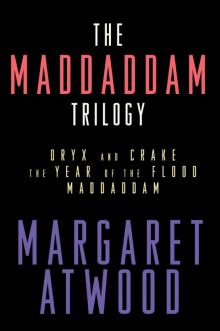 The MaddAddam Trilogy
The MaddAddam Trilogy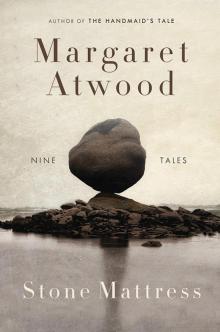 Stone Mattress
Stone Mattress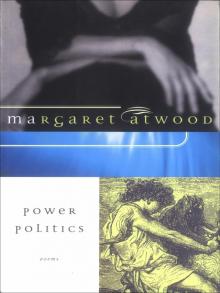 Power Politics
Power Politics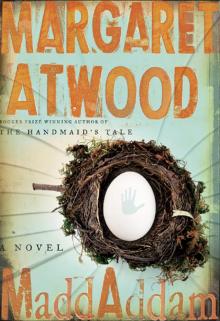 MaddAddam 03 - MaddAddam
MaddAddam 03 - MaddAddam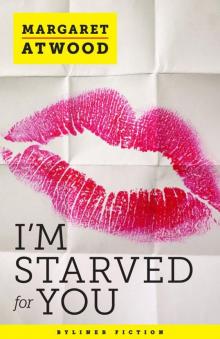 I’m Starved for You (Kindle Single)
I’m Starved for You (Kindle Single) Murder in the Dark
Murder in the Dark In Other Worlds
In Other Worlds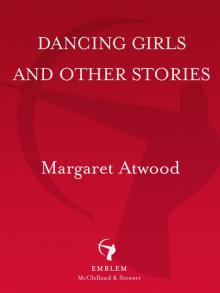 Dancing Girls
Dancing Girls Moral Disorder
Moral Disorder